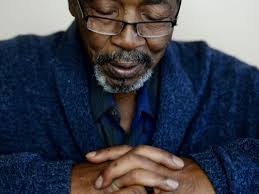Glenn Ford spent 30 years on death row for a crime he didn’t commit, but he is now dying.
And the prosecutor who put him in jail and to apologize for how the case was handled has visited the man convicted by an all-white jury.
There are disturbing issues, like the fact that the murder weapon’s location was the suppressed. His murder conviction was overturned only after the case was re-opened and the evidence showed he wasn’t even present at the scene of the killing.
Attorney Marty Stroud knows he can never erase what happened, but here is his new perspective (from the Shreveport Times):
“Had I been more inquisitive, perhaps the evidence would have come to light years ago. But I wasn’t, and my inaction contributed to the miscarriage of justice in this matter. Based on what we had, I was confident that the right man was being prosecuted and I was not going to commit resources to investigate what I considered to be bogus claims that we had the wrong man.
My mindset was wrong and blinded me to my purpose of seeking justice, rather than obtaining a conviction of a person who I believed to be guilty. I did not hide evidence, I simply did not seriously consider that sufficient information may have been out there that could have led to a different conclusion. And that omission is on me.
Furthermore, my silence at trial undoubtedly contributed to the wrong-headed result.
I did not question the unfairness of Mr. Ford having appointed counsel who had never tried a criminal jury case much less a capital one. It never concerned me that the defense had insufficient funds to hire experts or that defense counsel shut down their firms for substantial periods of time to prepare for trial. These attorneys tried their very best, but they were in the wrong arena. They were excellent attorneys with experience in civil matters. But this did not prepare them for trying to save the life of Mr. Ford.The jury was all white, Mr. Ford was African-American. Potential African-American jurors were struck with little thought about potential discrimination because at that time a claim of racial discrimination in the selection of jurors could not be successful unless it could be shown that the office had engaged in a pattern of such conduct in other cases.
And I knew this was a very burdensome requirement that had never been met in the jurisprudence of which I was aware. I also participated in placing before the jury dubious testimony from a forensic pathologist that the shooter had to be left handed, even though there was no eye witness to the murder. And yes, Glenn Ford was left handed.All too late, I learned that the testimony was pure junk science at its evil worst.
In 1984, I was 33 years old. I was arrogant, judgmental, narcissistic, and very full of myself. I was not as interested in justice as I was in winning. To borrow a phrase from Al Pacino in the movie ‘And Justice for All,’ ‘Winning became everything.’
After the death verdict in the Ford trial, I went out with others and celebrated with a few rounds of drinks. That’s sick. I had been entrusted with the duty to seek the death of a fellow human being, a very solemn task that certainly did not warrant any ‘celebration.’
In my rebuttal argument during the penalty phase of the trial, I mocked Mr. Ford, stating that this man wanted to stay alive so he could be given the opportunity to prove his innocence. I continued by saying this should be an ‘affront to each of you jurors, for he showed no remorse, only contempt for your verdict.’
How totally wrong was I.“
Over four percent of death penalty convictions in the United States are wrong. The National Exonerations Registry shows that as of 2015, 60% of exonerations after a wrongful conviction were for non-white defendants.
[table id=10 /]





